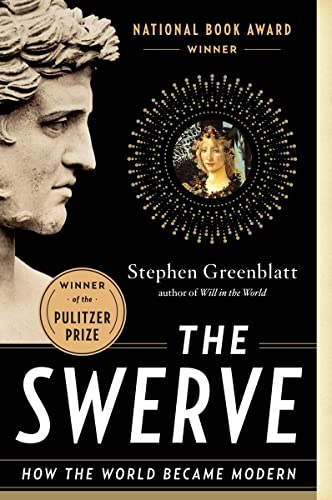Items related to The Swerve – How the World Became Modern

"synopsis" may belong to another edition of this title.
It's fascinating to watch Greenblatt trace the dissemination of these ideas through 15th-century Europe and beyond, thanks in good part to Bracciolini's recovery of Lucretius' poem.
In this gloriously learned page-turner, both biography and intellectual history, Harvard Shakespearean scholar Greenblatt turns his attention to the front end of the Renaissance as the origin of Western culture's foundation: the free questioning of truth.--starred review
In this outstandingly constructed assessment of the birth of philosophical modernity, renowned Shakespeare scholar Greenblatt deftly transports reader to the dawn of the Renaissance...Readers from across the humanities will find this enthralling account irresistible.--starred review
Can a poem change the world? Harvard professor and bestselling Shakespeare biographer Greenblatt ably shows in this mesmerizing intellectual history that it can. A richly entertaining read about a radical ancient Roman text that shook Renaissance Europe and inspired shockingly modern ideas (like the atom) that still reverberate today.
A fascinating, intelligent look at what may well be the most historically resonant book-hunt of all time.
Pleasure may or may not be the true end of life, but for book lovers, few experiences can match the intellectual-aesthetic enjoyment delivered by a well-wrought book. In the world of serious nonfiction, Stephen Greenblatt is a pleasure maker without peer.
The Swerve is one of those brilliant works of non-fiction that's so jam-packed with ideas and stories it literally boggles the mind.--Maureen Corrigan
"About this title" may belong to another edition of this title.
- PublisherW. W. Norton & Company
- Publication date2012
- ISBN 10 0393343405
- ISBN 13 9780393343403
- BindingPaperback
- Number of pages368
- Rating
Buy New
Learn more about this copy
Shipping:
£ 3.19
Within U.S.A.
Top Search Results from the AbeBooks Marketplace
The Swerve: How the World Became Modern
Book Description Condition: New. Fast Shipping - Safe and secure Mailer. Seller Inventory # 521X7W0005R0
The Swerve: How the World Became Modern
Book Description Paperback. Condition: New. Seller Inventory # 0393343405-11-25653918
Swerve : How the World Became Modern
Book Description Condition: New. Seller Inventory # 18663545-n
The Swerve: How the World Became Modern (Paperback or Softback)
Book Description Paperback or Softback. Condition: New. The Swerve: How the World Became Modern 0.98. Book. Seller Inventory # BBS-9780393343403
The Swerve: How the World Became Modern Format: Paperback
Book Description Condition: New. Brand New. Seller Inventory # 0393343405
The Swerve: How the World Became Modern by Greenblatt, Stephen [Paperback ]
Book Description Soft Cover. Condition: new. Seller Inventory # 9780393343403
The Swerve: How the World Became Modern
Book Description Condition: New. Brand New! Not Overstocks or Low Quality Book Club Editions! Direct From the Publisher! We're not a giant, faceless warehouse organization! We're a small town bookstore that loves books and loves it's customers! Buy from Lakeside Books!. Seller Inventory # OTF-S-9780393343403
The Swerve: How the World Became Modern
Book Description Paperback. Condition: New. Seller Inventory # BKZN9780393343403
The Swerve: How the World Became Modern
Book Description Condition: New. Buy with confidence! Book is in new, never-used condition. Seller Inventory # bk0393343405xvz189zvxnew
The Swerve: How the World Became Modern
Book Description Condition: New. New! This book is in the same immaculate condition as when it was published. Seller Inventory # 353-0393343405-new

